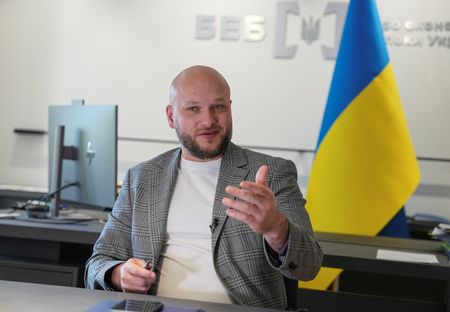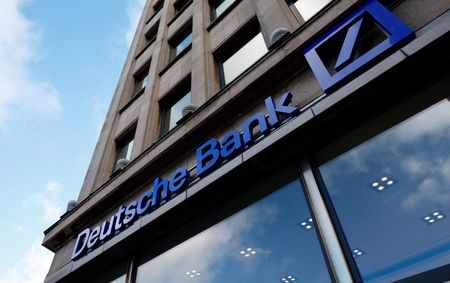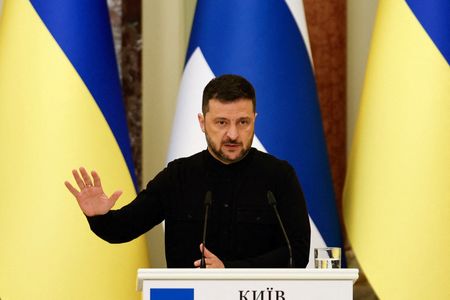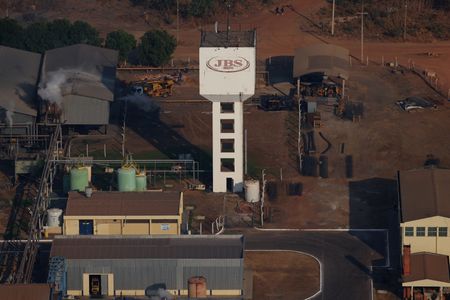By Dan Peleschuk
KYIV (Reuters) -Ukraine’s fledgling economic police need more resources to crack down properly on an untaxed shadow economy worth billions of dollars and create an investor-friendly climate, its director said in an interview.
Kyiv relies heavily on tax revenues to fund its war effort against Moscow, and considers foreign investment key to rebuilding its battered economy as it eyes membership of the European Union.
However Oleksandr Tsyvinskyi, appointed last month as director of the Economic Security Bureau of Ukraine (ESBU), said his agency remained understaffed and its employees underpaid as they seek to uproot deeply ingrained practices.
“If in many countries paying taxes is simply about welfare, then for us it’s about survival,” he told Reuters in Kyiv.
SHADOW ECONOMY MAY BE WORTH AS MUCH AS $24 BILLION
Estimates of Ukraine’s shadow economy range between the equivalent of $14.5 billion and $24 billion, said Tsyvinskyi, whose appointment was one of the requirements by Kyiv’s Western lenders to keep critical financial aid coming.
Ukraine’s economy, measured by gross domestic product, is forecast to be about $205 billion at the end of 2025, economists said.
The ESBU, one of several specialised law enforcement agencies established after a 2014 pro-democracy revolution, is tasked with investigating and preventing crimes like tax evasion and smuggling.
Strengthening the rule of law in Ukraine, where a legacy of Soviet rule led to endemic graft, and streamlining state management are critical to Kyiv’s EU bid.
Anti-corruption agencies have also stepped up their own efforts since Russia’s 2022 invasion.
However, amid a scramble for state resources, the ESBU is struggling to attract qualified employees and to assert itself in Ukraine’s crowded law enforcement landscape due to a lack of government funding, said Tsyvinskyi.
ESBU FUNDING FLAT IN 2026 BUDGET
The 2026 draft budget boosts spending for agencies like the National Anti-Corruption Bureau of Ukraine and the State Bureau of Investigation, but leaves ESBU funding largely unchanged, according to a copy posted by lawmaker Yaroslav Zhelezniak.
“Of course, the country is at war and there are many places where funding is necessary,” said Tsyvinskyi. “But our agency is the one in charge of bringing the money out of the shadows so that there’s more of it.”
The ESBU, which replaced the tax police in 2021, has yet to expand its staff of 1,260 to the 4,000 provided for by law. Only nine regional teams out of around two dozen envisaged are operational.
LEVELLING THE PLAYING FIELD
Tsyvinskyi, a former anti-corruption detective, pledged to press ahead with a crackdown on tax evasion and contraband, particularly involving tobacco, alcohol and fuel.
He said levelling the playing field for business, which has long struggled against predatory law enforcement, would inspire more faith in economic growth and motivate more firms to pay taxes.
Currently, Ukraine’s state revenues finance the military while Western lenders cover costs like public salaries and pensions. Projected expenditure for 2026 exceeds $117 billion, Prime Minister Yulia Svyrydenko said this week.
The government aims for higher budget revenues in 2026 and listed improving tax collection and raising revenues from customs as key measures, the draft budget showed.
Tsyvinskyi added that a stronger and better equipped ESBU would also strengthen a new campaign by Svyrydenko to crack down on excessive law enforcement checks of businesses.
“It’s a simple formula: A successful ESBU means a lack of pressure on business. A successful ESBU means business earns more,” he said.
“A successful ESBU means less borrowing from abroad.”
(Reporting by Dan Peleschuk; Additional reporting by Olena Harmash; Editing by Sharon Singleton)










